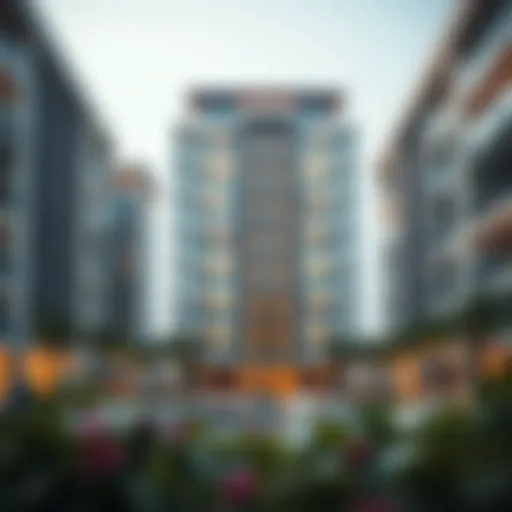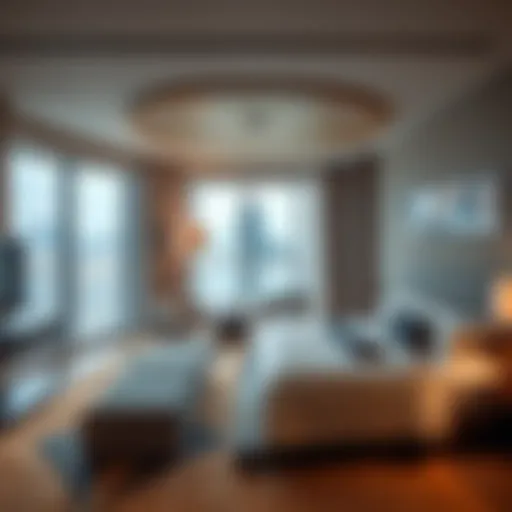Life in Dubai: Exploring Living and Investment Opportunities
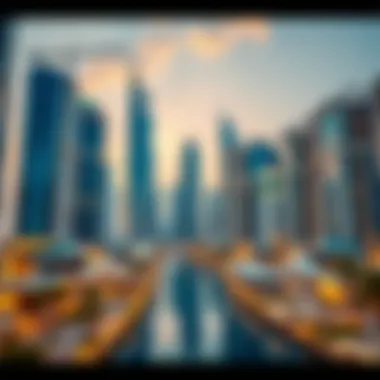
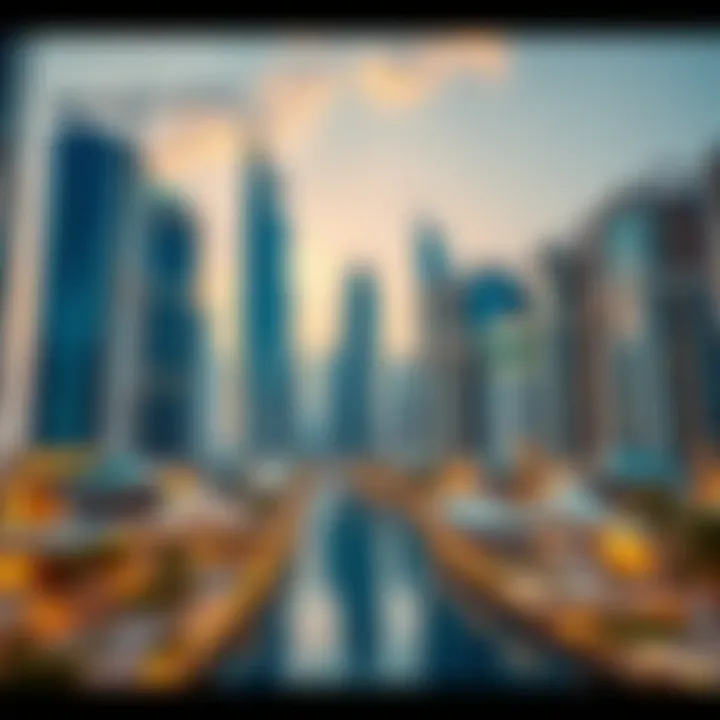
Intro
Living in Dubai offers a unique blend of luxury, culture, and opportunity that is hard to find elsewhere. As a melting pot of backgrounds and traditions, Dubai stands out as a marvel in modern living. This city is not merely about its towering skyscrapers and lavish shopping malls. It’s about the everyday experiences of its residents and the vibrant communities that thrive within.
The UAE’s economic backbone is built on diverse sectors, from trade and tourism to real estate and technology. This economic fruitfulness has drawn people from all over the globe, making the city an enticing hub for both investors and homebuyers. But what does it really mean to call Dubai home? It’s essential to dissect the layers of this dynamic city to truly understand its essence.
To navigate through this article, we will examine a range of themes surrounding life in Dubai. From market trends and insights to property listings and comparisons, this guide will paint a vivid picture of living in this remarkable destination. Following sections will explore cultural diversity, lifestyle, and how the economic landscape shapes the daily lives of those in Dubai.
Market Trends and Insights
Current Market Analysis
Presently, Dubai’s real estate market is witnessing a transformation, shaped by innovations and evolving buyer preferences. The market has maintained a steady pulse, even amid global uncertainties. In 2023, the property market saw a notable increase in sales, driven primarily by the growing population and increasing demand for rental properties. The emirate's focus on sustainability and smart city initiatives has also created a fertile ground for certain sectors, particularly in residential developments and eco-friendly infrastructures.
The luxury sector, in particular, has drawn both local and foreign investors, boosted by an influx of high-net-worth individuals seeking premium properties with expansive amenities. Real estate developers have responded swiftly to this trend, launching high-end projects featuring chic interiors, views of the iconic skyline, and landscapes that resemble a tropical paradise.
Historical Trends and Future Predictions
Looking back, Dubai’s real estate market reflects a rollercoaster ride through highs and lows. In the late 2000s, rapid growth preceded a sharp downturn brought on by the global financial crisis. However, since 2010, the market has rebounded, evolving to resonate with a more strategic outlook by discerning buyers.
Predictions for the future of Dubai’s property market suggest further stability and growth.** As the city hosts more international events, such as Expo (postponed to due to the pandemic), and implements plans for smart urban living, experts forecast a **continued appeal for investment in both luxury and affordable housing.
Property Listings and Comparisons
Luxury Properties Overview
For those with deeper pockets, the luxury property segment in Dubai is nothing short of eye-catching. Properties like The Address Residence Sky View and Bulgari Resort & Residences continue to attract attention. These developments showcase exquisite grand lobbies, infinity pools, and direct access to the marina and beaches, marrying comfort with elegance.
Affordable Housing Options
Not everyone is looking for plush residences. Many are seeking comfortable but affordable dwelling places, especially expatriates, young professionals, and families. Areas such as Dubai Marina and Jumeirah Village Circle offer appealing options without the hefty price tag. Affordable housing projects are cropping up, providing quality living spaces that prioritize family-friendly amenities, green spaces, and community building.
As we venture deeper into our exploration of what it means to live in Dubai, understanding these market dynamics will offer invaluable insights for potential investors, homebuyers, and keen observers of the real estate landscape.
Cultural Fabric of Dubai
The cultural fabric of Dubai is a remarkable tapestry woven from the threads of history, tradition, and modernity. Each layer of this unique structure reveals the city's character, offering profound lessons to investors, homebuyers, and those interested in the dynamics of living here. In a world where cultural diversity is often celebrated, Dubai stands out as a shining example of how different traditions can coexist and flourish.
Historical Context
To understand Dubai's present, one must first look at its rich historical context. For centuries, this region was primarily known for its pearl diving and fishing industries. However, the discovery of oil in the 20th century transformed Dubai from a small coastal town into a thriving metropolis. This pivotal moment attracted traders and entrepreneurs from around the globe, laying the groundwork for Dubai’s cosmopolitan nature.
Dubai has always been a crossroads. Merchants traveled through the region, bringing with them their customs and beliefs. This led to a melting pot of cultures, where influences from Asia, Europe, and Africa came together. The local Emirati culture, with its deep-rooted traditions, found a way to coexist with these diverse influences. As a result, visitors and residents alike can experience a rich mix of old and new, from ancient forts and museums to state-of-the-art skyscrapers.
Today, history is not merely a remembrance but an integral part of the daily lives of Dubai's residents. Local customs are preserved and celebrated through various cultural festivals. Places such as the Dubai Museum and Al Fahidi Historical Neighborhood serve as reminders of the past and contribute significantly to the overall experience of life in the emirate.
Modern Multiculturalism
Dubai's modern multiculturalism is a noteworthy aspect that paints the city in vibrant colors. Its population hails from over 200 nationalities, making it one of the most diverse cities in the world. This rich mix creates a unique social landscape, where various languages, traditions, and perspectives converge.
From the energetic bullion markets bustling with Indian traders to the spice souks filled with aromas from the Middle East, the visual and sensory experiences reflect this diversity. The annual Dubai Shopping Festival and the Global Village showcase this multicultural essence, allowing local and international residents to share and experience one another’s heritage.
However, the blend of cultures comes with its challenges. Different ways of life and varying social norms can lead to misunderstandings. Residents must navigate these cultural nuances, leading to a deepened respect for differing perspectives. This intricate dance of coexistence makes life in Dubai not only an adventure but also a continuous learning journey.
"In Dubai, you don’t just see the world; you feel it. Each neighborhood whispers tales of far-off lands and brings together traditions in ways you'd never imagine."
Ultimately, the cultural fabric of Dubai is not merely about coexistence but about the potential for collaboration and synergy. The city stands as a testament to what is achievable when diverse communities come together, creating a vibrant mosaic that attracts investors, tourists, and settlers alike. The blend of heritage and innovation ensures that as the city grows, it maintains the essence of what makes it truly remarkable, enriching the lives of all who call this place home.
Living Arrangements
Living arrangements in Dubai play a crucial role in shaping the day-to-day experience for both residents and newcomers. Understanding the different types of housing available and their characteristics offers valuable insights into what life is really like in this vibrant city. With diverse options that cater to various lifestyles and budgets, choosing the right living space is an essential step for anyone looking to settle down in this metropolis.
Types of Housing
Luxury Villas
Luxury villas in Dubai epitomize opulence and provide an unparalleled living experience. With their spacious layouts, high-end finishes, and private outdoor spaces, these homes are often equipped with advanced technology and modern amenities that cater to a relaxed lifestyle.
One key characteristic of luxury villas is their exclusivity, which appeals to affluent residents seeking privacy or a lavish lifestyle. Nestled in verdant communities like Emirates Hills and Jumeirah, these residences offer breathtaking views and proximity to upscale dining and shopping.
However, it’s important to note that the maintenance and overall cost of living in luxury villas can be significant. The advantage lies in the prestige and comfort they offer, while the disadvantage may be the hefty price tag that comes with them. Residents must weigh these factors carefully when considering these dreamy abodes.
High-Rise Apartment Living
High-rise apartment living is another hallmark of Dubai’s residential landscape. Skyscrapers like the Burj Khalifa are not just iconic landmarks; they offer comfortable living spaces with spectacular views of the city skyline. The convenience of being close to major business districts, shopping centers, and public transport makes high-rise apartments attractive for many.
The key characteristic of high-rise living is the community aspect—many buildings provide amenities like gyms, pools, and communal areas. This lifestyle is particularly appealing to young professionals and expatriates looking for an active social life.
On the flip side, living in a high-rise can come with challenges, such as noise and limited outdoor space. Despite these minor drawbacks, the benefits of city living and the vibrant atmosphere make it a popular choice for those wanting to embrace urban life.
Affordable Housing Options
Affordable housing options in Dubai are increasingly becoming available as the city aims to provide inclusive living solutions. This segment targets middle-income families and individuals seeking comfortable yet cost-effective living arrangements.
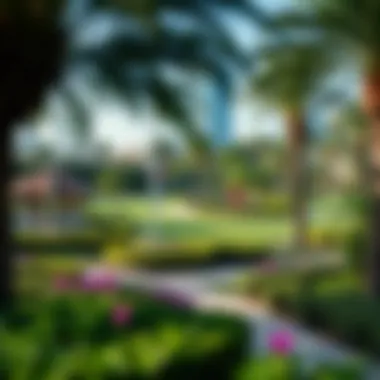
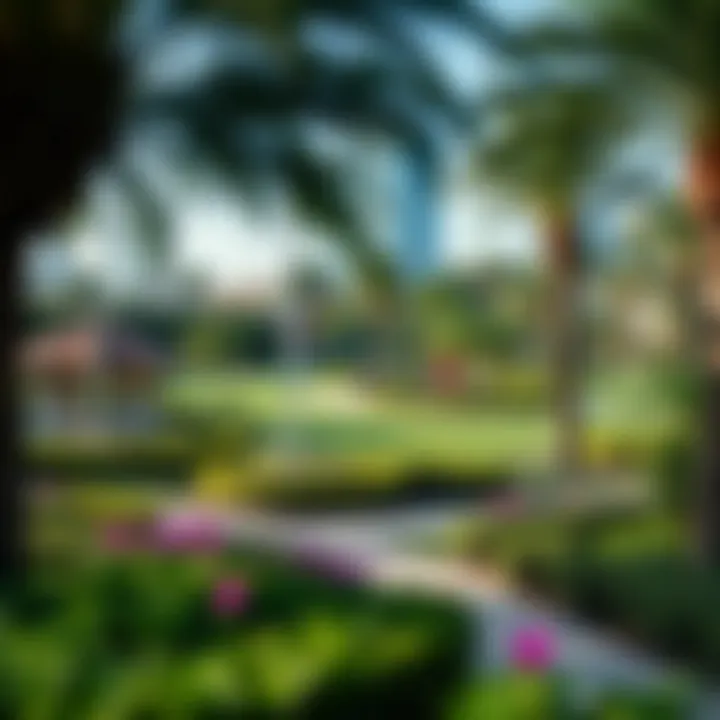
An important characteristic of affordable housing in Dubai is its location, often situated in up-and-coming neighborhoods. These areas allow residents to enjoy community vibes while being within reach of essential amenities and services.
A notable feature of these affordable options is the variety they offer—from smaller apartments in developing areas to family houses in gated communities. However, it’s essential to consider that while these options are less expensive, they may not have the luxury or amenities found in high-end residences. Striking a balance between budget and lifestyle is crucial when choosing affordable housing.
Key Neighborhoods
Downtown Dubai
Downtown Dubai is considered the heartbeat of the city, featuring a mix of residential, commercial, and leisure spaces. This area is home to iconic landmarks like the Burj Khalifa and the Dubai Mall, making it a vibrant, sought-after neighborhood for both locals and expatriates.
The allure of Downtown lies in its luxurious high-rises and affluent lifestyle, attracting those who enjoy a dynamic atmosphere filled with entertainment and fine dining. However, living in such a prime location often comes with a premium price tag. The benefits are undoubtedly high, but residents should be ready for the financial implications.
Dubai Marina
Dubai Marina is a stunning waterfront community that blends modern living with leisure and luxury. With its picturesque views of the marina and easy access to various recreational activities, it has become popular among families and young professionals looking for a lively atmosphere.
A key feature of Dubai Marina is the availability of upscale apartments and townhouses near the water, which offers a unique living experience in contrast to the city��’s bustling streets. Life in this area promotes a community vibe with plenty of cafes, shops, and events.
However, it’s important to consider that the Marina can become crowded, especially during tourist seasons. While the lifestyle is vibrant, some may find the noise and hustle a bit overwhelming.
Al Quoz
Al Quoz is often overlooked, yet it stands out as a hub of creativity and low-cost living options. With a mix of art galleries, warehouses, and residential areas, this neighborhood reflects the artistic spirit of Dubai. As it is still developing, it offers more affordable housing compared to the more well-known areas.
The neighborhood’s unique charm lies in its eclectic mix of residents, ranging from artists to professionals, fostering a sense of community. Al Quoz features practical amenities, making it a convenient choice for families and individuals wanting a balanced lifestyle.
On the downside, the area’s ongoing development means some may worry about noise and construction activities. That said, its potential for future growth and community engagement makes it an intriguing choice for those willing to embrace a bit of adventure.
Economic Opportunities
The fabric of Dubai’s economy is vibrant, woven with numerous threads that offer substantial prospects for both residents and visitors. Understanding the economic landscape is not just for number crunchers; it's essential for anyone considering making Dubai their home or launching an investment venture. The job market is a key pillar supporting the growth of the Emirate, alongside an entrepreneurial ecosystem that fosters innovation and development. This section explores these critical aspects to highlight why Dubai is a magnet for talent and investors alike.
Job Market Insights
Dubai’s job market reflects its stature as a global hub. With an array of sectors ranging from finance to healthcare to technology, the employment landscape is a smorgasbord of opportunities. According to recent statistics, certain industries are in high demand, particularly technology, healthcare, and tourism. This is due in part to the government’s focus on diversifying the economy away from oil dependency.
*
- Tech Innovations: Startups and established companies alike flock to Dubai to harness cutting-edge technology. From artificial intelligence to blockchain, jobs in IT are booming.
- Healthcare Providers: With an increasing population, healthcare professionals are essential for sustaining quality health services.
- Tourism and Hospitality: The city’s goal to attract 25 million visitors by 2025 means there are countless roles in this sector, from management to customer service.
A significant perk of the job market in Dubai is the absence of personal income tax. This means more bang for your buck, as salaries tend to be higher when compared to other global cities, creating an appealing proposition for expats. However, competition can be stiff, and securing employment may require patience and networking skills. But once you get your foot in the door, the career growth potential is often quite remarkable.
Entrepreneurial Landscape
If you’ve ever dreamt of starting your own business, Dubai offers fertile ground. The entrepreneurial environment here is uniquely stimulating, buzzing with initiatives designed to make business setup as smooth as possible. The government has implemented several policies to enhance the ease of doing business.
Here are some elements that symbolize the entrepreneurial spirit in Dubai:
- Flexible Business Structures: Entrepreneurs can choose from free zones that cater to various industries, providing advantages like 100% ownership and tax incentives. For instance, Dubai Multi Commodities Centre is a haven for businesses in trade and commodities.
- Access to Investment: With venture capital on the rise, securing funding is less of a hurdle. Investors are particularly keen on tech startups as Dubai positions itself as a leading tech hub in the Middle East.
- Networking Opportunities: Frequent business events and expos give budding entrepreneurs a platform to forge connections and gain invaluable insights. The Arab Health Exhibition is a prime example, focusing on healthcare innovations.
Establishing a business in Dubai is not without its challenges, though. Regulatory hurdles and understanding local laws can be daunting, especially for non-native speakers. Seeking counsel from local experts can steer you clear of common pitfalls.
The landscape of opportunity in Dubai is always evolving, making it a place where aspirations can truly meet reality.
For further insights and guidance on navigating the job market and entrepreneurial avenues in Dubai, it is wise to check resources such as Dubai Chamber and Gulf Business.
Real Estate Dynamics
The significance of real estate dynamics in the context of living in Dubai cannot be overstated. This city has transformed into a bustling hub for investment, and understanding the nuances of this market is essential for anyone looking to make informed decisions. The ever-evolving landscape provides a plethora of opportunities for investors and homebuyers alike. As the demand for housing continues to grow, newcomers and long-term residents alike find themselves exploring various options within the real estate sector.
Investment Trends
Commercial vs. Residential Investments
In the realm of real estate, commercial and residential investments each carry distinct characteristics and attract different types of investors. While residential properties cater to individuals and families looking for homes, commercial properties are often geared towards businesses and enterprises that seek to establish a presence in the city.
Key Characteristics: Residential investments tend to be viewed as relatively stable, often providing consistent rental yields with potential appreciation over time. In contrast, commercial properties, depending on their location and type, can yield higher returns but are often more susceptible to market fluctuations.
Advantages/Disadvantages: One unique aspect of commercial real estate in Dubai is the potential for longer lease terms, which can lead to more secure and predictable cash flows compared to residential leases, which typically turn over more frequently. However, the initial investment and associated risks can be significantly higher when investing in commercial properties.
Emerging Markets
Emerging markets within Dubai's real estate scene present exciting opportunities for investors who are willing to take a bit of a gamble. These are areas that are on the brink of development or have recently seen revitalization efforts.
Key Characteristics: This segment is characterized by the potential for rapid growth and development, often drawing the attention of savvy investors. Neighborhoods that were once overlooked may experience a surge in interest due to government initiatives, infrastructure projects, or changes in zoning laws.
Advantages/Disadvantages: The allure of emerging markets lies in their ability to offer properties at competitive prices, which, in hindsight, could yield substantial returns as the area develops. That said, investing in these markets poses risks as well; it is critical to conduct thorough research on growth projections and local developments to avoid pitfalls in investment.
Buying Process
Key Considerations
When diving into the buying process for real estate in Dubai, several key considerations must be taken into account. Firstly, understanding the local marketplace is fundamental to making an informed decision. Investors should be mindful of market trends, pricing, and the availability of potential properties.
Key Characteristic: One of the main features of buying property in Dubai is the variety of financing options available to both locals and expatriates. This flexibility allows for customization of the purchasing process, which can be an advantage for many homebuyers.
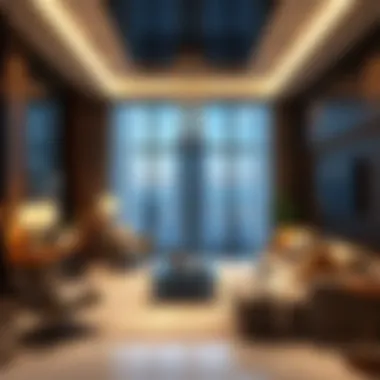
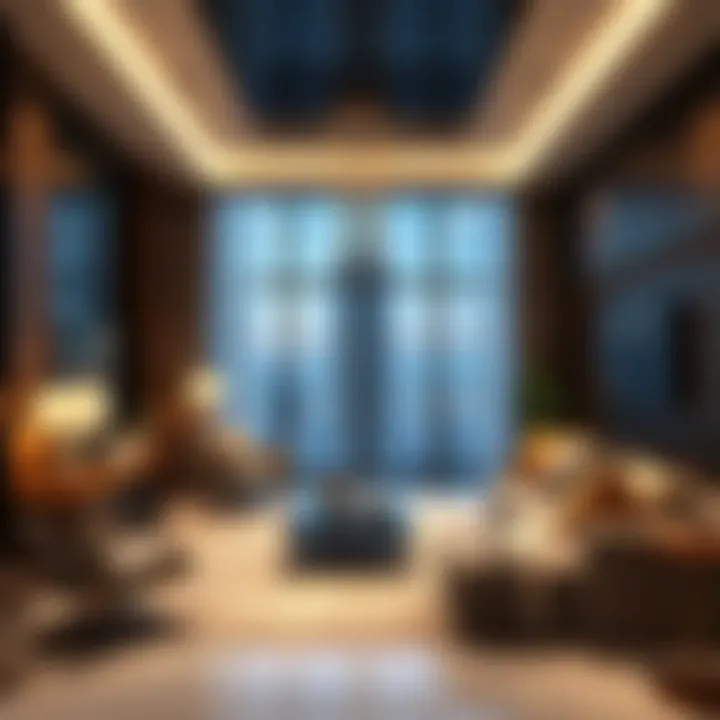
Advantages/Disadvantages: Potential buyers should also consider the timelines involved in the purchasing process, including paperwork and legal aspects. While the processes have been streamlined compared to previous years, delays can still occur that might affect your investment timing.
Legal Framework
Understanding the legal framework surrounding property ownership in Dubai is paramount for any potential real estate investor. This includes familiarity with laws regarding ownership rights, especially for expatriates, as well as regulations governing property transactions.
Key Characteristic: In Dubai, foreign nationals can own property in designated freehold areas, which is a significant benefit for overseas investors. Highlighting this unique aspect can be a strong motivation for many expats considering investing in real estate.
Advantages/Disadvantages: On the flip side, navigating the legal landscape can seem daunting. There are various fees, taxes, and documents required that may not be immediately clear to new investors. Legal counsel and local expertise can mitigate many of these issues but may require additional investment upfront.
The real estate dynamics in Dubai present both exciting opportunities and unique challenges for investors and buyers. Understanding these aspects is crucial for making informed decisions in a rapidly changing environment.
Lifestyle Amenities
In a place like Dubai, where the pace of life can be as frenetic as the city's towering skyscrapers, lifestyle amenities play a critical role in shaping not just the everyday experiences of residents but also their overall quality of life. These amenities can vary widely, influencing everything from family choices to leisure activities and community interactions. With the city's unique blend of tradition and modernity, the amenities available contribute significantly to the allure of Dubai, making it a magnet for both potential residents and investors.
Education and Health
International Schools
International schools in Dubai stand out for their diverse educational offerings, accommodating expatriates and local families alike. These institutions often provide a curriculum aligned with global standards, preparing students for a world that demands adaptability and critical thinking. A key characteristic of international schools is the multicultural environment, where children from various backgrounds learn together, fostering not just academic excellence but also social understanding and acceptance.
One significant advantage these schools offer is the wide array of extracurricular activities, extending beyond academics to arts, sports, and community service. The varied timetables and resources can cultivate not just well-rounded students but also lifelong friendships. However, it's important to note that this comes at a cost; tuition fees can be steep, putting financial strain on some families looking for quality education in the emirate.
Healthcare Facilities
Healthcare facilities in Dubai are another pillar of lifestyle amenities, where quality meets accessibility. The healthcare system is primarily private, with a high standard of care bolstered by state-of-the-art technology and highly trained medical personnel. Hospitals like the American Hospital Dubai and Mediclinic have built a reputation not only for their medical expertise but also for patient-focused environments.
What sets these facilities apart is how they integrate advanced medical practices with a commitment to patient comfort, making visits less daunting. Furthermore, insurance coverage is increasingly becoming a norm, making healthcare more affordable for residents. Yet, the reliance on private healthcare services can create hurdles, particularly for those without comprehensive health insurance, potentially limiting access to essential care.
Leisure and Entertainment
Malls and Shopping
Malls and shopping in Dubai are not just about retail; they embody a lifestyle—combining luxury, leisure, and culinary experiences into one sprawling package. Destinations like The Dubai Mall and Mall of the Emirates are famous not only for their impressive selection of brands but also for entertainment options such as indoor skiing and giant aquariums. This is where shopping transcends mere purchasing; it becomes an event, a spectacle.
The unique feature of these malls is their ability to cater to all types of shoppers, from high-end clientele to families looking for affordable dining options. However, while these shopping havens offer an array of choices, they also face criticism for promoting consumerism and sometimes detaching individuals from more local or traditional spending practices. It's a delicate balance in a city known for both its opulence and its deep-rooted history.
Parks and Recreation
Parks and recreational areas in Dubai provide essential breathing spaces amid the urban hustle. The city's commitment to green spaces is demonstrated through meticulously maintained parks like Al Barsha Pond Park and Zabeel Park, which offer residents a chance to unwind, exercise, and connect with nature. These parks often feature jogging paths, playgrounds for children, and quiet spots for relaxation.
What makes these parks particularly beneficial is their accessibility; many are located near residential areas, promoting a healthy lifestyle within walking distance. The disadvantages, however, can include overcrowding, especially during weekends and holidays when families flock to these spots for picnics and social gatherings. Still, the availability of parks adds substantial value to the overall living experience in Dubai, encouraging outdoor activities, social interactions, and community cohesion.
"Lifestyle amenities are not just conveniences; they are the fabric that holds community life together in Dubai."
In summary, the lifestyle amenities in Dubai reflect the city's dynamic nature, catering to a diverse population's needs and preferences. From the educational institutions shaping future generations to the healthcare facilities ensuring physical well-being, these aspects contribute to a high standard of living. Meanwhile, leisure options enhance daily life, blending shopping, entertainment, and relaxation seamlessly. For those investing in or moving to this vibrant city, understanding these amenities provides valuable insights into the day-to-day realities of life in Dubai.
Transportation Infrastructure
The significance of transportation infrastructure in Dubai cannot be overstated. It serves as a lifeline connecting residents, businesses, and tourists alike, ensuring a seamless flow of people and goods throughout the city. Given Dubai's rapidly growing population and its role as a global business hub, an efficient transportation system is essential for maintaining the city’s dynamic pace of life and fostering economic growth.
In this section, we will explore the components of Dubai's transportation infrastructure, focusing specifically on the public transport system and the road networks that support this vibrant metropolis.
Public Transport System
Dubai has made remarkable strides in developing its public transport system, which is crucial for easing congestion and reducing reliance on private vehicles. One key element is the Dubai Metro, a modern, driverless rapid transit system that spans over 75 kilometers. Connecting key areas such as the Dubai Mall, Burj Khalifa, and Dubai Marina, it's a convenient option for daily commuters and tourists alike.
In addition to the Metro, the bus network complements the transit system, covering vast areas and providing essential links to various neighborhoods and business districts. The buses are air-conditioned and equipped with modern amenities, making travel comfortable. Moreover, the Roads and Transport Authority (RTA) has introduced water taxis and abra boats, offering unique ways to traverse the city's waterways.
The use of smart technology enhances this system further. For instance, passengers can track bus and metro schedules in real time using mobile applications. Such tools not only improve convenience but also help in planning journeys more effectively.
"Efficient public transport in Dubai is more than just a convenience; it’s a vital part of its economic fabric."
Road Networks
The road networks in Dubai exemplify urban planning at its finest. Spanning hundreds of kilometers, these highways and streets are designed to accommodate high volumes of traffic, which is critical given the city's rapid expansion. Key routes like Sheikh Zayed Road, Emirates Road, and Al Khail Road not only connect different parts of the city but also link Dubai to other emirates, facilitating trade and travel across the region.
A notable feature of Dubai's road infrastructure is the provision of well-maintained lanes for both cars and larger vehicles, along with extensive traffic management systems that include smart traffic signals, toll gates, and real-time traffic updates. These innovations help to keep the roads from becoming choked with congestion, ensuring a smoother commute.
Furthermore, the focus on sustainability is evident in the increasing number of cycling paths and pedestrian-friendly walkways. These additions are aimed at encouraging greener modes of transportation and enhancing the overall quality of urban life.
Legal Considerations for Residents
Navigating the legal landscape in Dubai is crucial for anyone looking to settle down or invest in this dynamic city. Understanding the intricacies of local laws not only ensures compliance but also enhances the living experience. When it comes to legal considerations, there are a couple of pivotal areas that prospective residents should be well-acquainted with: Visa regulations and Ownership rights.
Visa Regulations
Visa regulations define the framework under which expatriates can legally reside in Dubai. The United Arab Emirates (UAE) has streamlined its visa processes, making it fairly approachable for foreigners. There are multiple types of visas, including employment visas, investor visas, and family visas, each catering to different needs.
- Employment Visa: This is typically sponsored by an employer and grants workers residency linked to their job. Understanding the terms, including duration and renewal processes, is necessary.
- Investor Visa: For those looking to invest in property or a business, the investor visa allows for residency based on investment amount. Recent reforms have made this more accessible.
- Family Visa: This option allows expatriates to sponsor family members, ensuring a family can stay together in Dubai.
The importance of maintaining compliant status cannot be understated. An expired visa can lead to fines or, in severe cases, deportation. Therefore, keeping track of visa expiration dates and understanding renewal processes is essential.
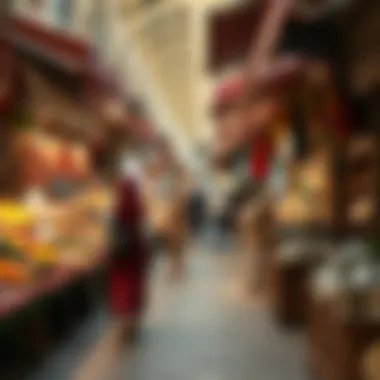
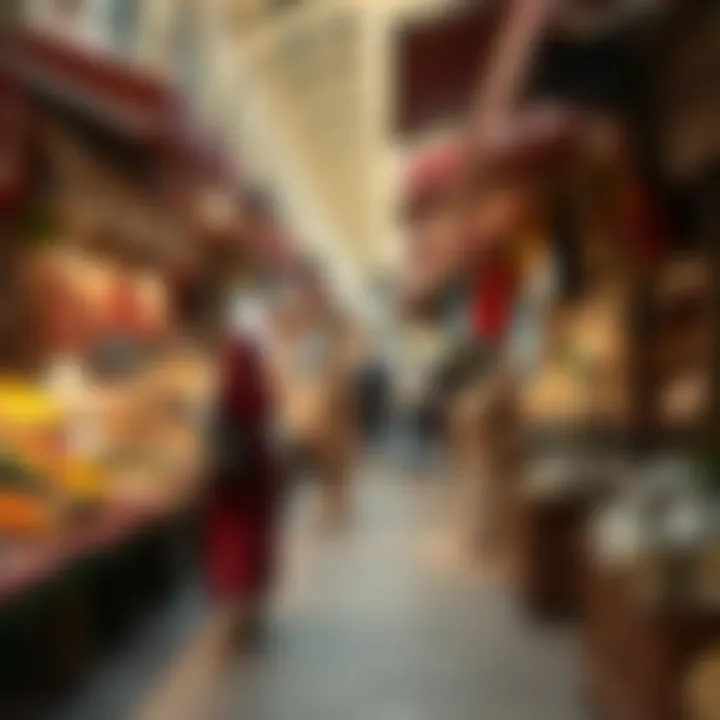
"Being in the know about visa requirements can save you from unnecessary complications, not to mention fines!"
Ownership Rights
Owning property in Dubai comes with its unique set of rules and regulations. Understanding these is pivotal for both investors and residents. The UAE's real estate laws allow foreigners to purchase property in designated areas, which has made the market vibrant and appealing.
- Freehold Property: Foreigners can own freehold properties in designated developments. This grants full ownership rights, similar to local citizens, allowing for ease of sale, lease, or inheritance.
- Leasehold Property: Alternatively, leasehold agreements allow expatriates to own property for a specified duration, typically up to 99 years. However, they must understand the terms governing this lease, as it dictates usage rights and renewal options.
- Property Registration: All sales and purchases must be registered with the Dubai Land Department. This process not only protects buyers but also establishes legal ownership.
It's advisable for newcomers to consult with a local real estate expert who can navigate the often intricate property laws, ensuring a secure investment.
Understanding both visa regulations and ownership rights makes a significant positive impact on life in Dubai. Residents who grasp these legal nuances can avoid pitfalls and make the most of their Dubai experience. For a comprehensive understanding of these topics, resources such as Gulf News, Dubai Land Department, and UAE Government provide valuable information.
Sustainability and Future Developments
Sustainability is no longer a buzzword; it’s becoming a fundamental principle in urban development, particularly in cities like Dubai. As Dubai continues to grow and allure investors, it’s essential to look at how sustainability interweaves with the city's future developments. This section dives into eco-friendly initiatives and what the vision for 2030 means for residents and businesses alike.
Eco-Friendly Initiatives
Dubai has embarked on a mission to transform its urban landscape into one that champions sustainability. The government has rolled out various eco-friendly initiatives aimed at improving environmental conditions while fostering economic growth.
Some notable projects include:
- Green Building Code: This mandates all new constructions to meet specific environmental standards, significantly reducing energy and water consumption.
- Solar Energy Projects: The Mohammed bin Rashid Al Maktoum Solar Park strives to be among the largest renewable energy projects in the world, aiming for a capacity of 5,000 megawatts by 2030. This park plays a crucial role in reducing the carbon footprint of the city.
- Waste Management Programs: Emphasizing recycling and composting, these programs target minimizing landfill waste. The city aims for a zero-waste initiative by pushing innovative waste management strategies.
- Public Transport Initiatives: Initiatives like the Dubai Metro and electric bus systems aim to reduce congestion and emissions, making it easier and more efficient for people to get around without solely relying on fossil-fuel vehicles.
"Implementing sustainable practices is not just a necessity; it's a strategy for future resilience."
These initiatives reflect a long-term commitment towards an eco-conscious lifestyle. They provide investors with an opportunity to be part of a forward-thinking community that values responsibility and innovation.
Vision for
The Vision for 2030 symbolizes Dubai’s aspirations to be a leading sustainable city. This strategic plan prioritizes sustainability is not only in governance but also in daily living and business practices.
Key components of this vision include:
- Smart City Concept: Integrating technology with daily services to enhance efficiency in resource management. Innovations like smart grids for energy distribution reduce waste and improve output.
- Economic Diversification: Reducing reliance on oil and embracing sectors like technology, tourism, and sustainable industries. This diversification not only creates jobs but encourages a more resilient economy.
- Cultural and Social Sustainability: Promoting an inclusive society that celebrates diversity while ensuring quality of life through access to essential services and cultural programs.
The Vision for 2030 positions Dubai to be not just a place where people come to work and live, but a model for sustainable metropolitan living worldwide. As this vision progresses, it is likely to attract not just residents but also global investors who are conscious about sustainability.
In summary, sustainability is deeply embedded in Dubai's development narrative. By harnessing innovative practices while promoting economic opportunities, the city aims to lead by example, proving that modern living can harmonize with environmental stewardship.
Community and Social Life
Living in Dubai transcends mere residence; it is about being part of a vibrant social fabric that interweaves diverse cultures and traditions. The community aspect shapes not only day-to-day life but also the overall quality of living in this dynamic city. A strong community can foster connections, support networks, and a sense of belonging, all of which contribute significantly to the well-being of residents. This section explores the elements that define community and social life in Dubai, highlighting the benefits and considerations for those considering making this city their home.
Cultural Events and Festivals
Dubai is a melting pot of cultures, and this diversity is vibrantly illustrated through its numerous cultural events and festivals. Each year, the city pulses with celebrations that not only depict its rich heritage but also embrace different cultures from around the world.
These festivals serve several purposes: they enhance social interactions, provide entertainment, and foster greater understanding among community members. Popular events include the Dubai Shopping Festival and Dubai Food Festival. During these times, one can see the city transform into a hive of activity, where the streets are adorned with lights, food stalls pop up, and local artists showcase their talents.
Moreover, the cultural emphasis is also on enriching experiences. Events like the Emirates Festival of Literature invite authors from various backgrounds to engage with the community, sparking conversations. Such interactions are fundamental in cultivating a community spirit that embraces diversity.
- The Dubai International Film Festival showcases global cinema, inviting filmmakers and enthusiasts alike, enhancing connections within the cultural community.
- Celebrating Islamic holidays, such as Eid, witnesses families coming together for prayers and festivities, emphasizing the importance of family and community ties.
These gatherings are more than just entertainment; they are crucial for networking, making new friends, and even business opportunities. For expats and locals alike, engaging in these events often provides a sense of belonging that can ease the transition into a new environment.
Social Interactions
Social life in Dubai reflects a complex interplay of traditions and modernity. The city is known for its dynamic social scene, characterized by informal gatherings and luxurious events. Restaurants, cafes, and lounges serve as communal meeting spots, blending different cuisines and cultural flavors, thus allowing for casual minglings that often lead to lasting friendships.
Additionally, Dubai's expat community is robust, often leading to organized social groups and clubs tailored to various interests—from sports to arts and everything in between. Participating in these clubs can be a delightful way for new residents to build connections.
Networking events targeted at professionals happen routinely—a real boon for those looking to advance their careers or find business collaborators. In fact,
many organizations host meetups focused on industry-specific discussions that not only broaden professional horizons but also facilitate social interactions.
"Community is about belonging, and in Dubai, there's always a place for everyone."
Links for Further Exploration:
Understanding the community and social fabric of Dubai is essential for anyone considering a move here. The richness of cultural events and the opportunities for social interaction not only enhance individual experiences but also contribute to a thriving, interconnected society.
Culmination and Insights
Living in Dubai presents a dynamic interplay of culture, opportunity, and lifestyle benefits, threading through the fabric of daily existence here. As the dust settles on the previous discussions, it’s essential to distill the myriad elements into digestible insights. This final section isn’t just a wrap-up; it serves as a compass for potential residents, investors, and stakeholders, shedding light on both the allure and the complexities of making Dubai a home or a place for business.
Understanding the Essence of Living in Dubai isn’t confined to admiring its skyline or enjoying its luxurious amenities. It encompasses a broader view that touches on effective networking opportunities, the importance of cultural adaptability, and the impact of legal frameworks on residency and business operations.
Summation of Key Points
- Cultural Diversity: Dubai boasts a melting pot of cultures, where various communities coexist and thrive. This multicultural environment enhances networking, business opportunities, and social interactions, making it easier for newcomers to settle in.
- Real Estate Landscape: The property market in Dubai stands out for its investors. With various options ranging from high-rise apartments to lavish homes in gated communities, potential buyers have wide-ranging choices to fit their budgets and lifestyles.
- Economic Ventures: The city’s growth trajectory spells good news for those looking to engage in entrepreneurial pursuits. With tax incentives and a supportive regulatory environment, Dubai plays host to a thriving business ecosystem.
- Lifestyle Amenities: From shopping malls to parks, and international schools to advanced healthcare facilities, Dubai caters to all facets of modern life, ensuring a high quality of living.
- Transport Infrastructure: An efficient transport network supports connectivity, which is crucial in a sprawling city like Dubai. This includes a comprehensive public transport system and well-maintained road networks that facilitate movement within the city.
Final Thoughts on Dubai Living
In closing, the journey of understanding life in Dubai is as vibrant as the city itself. It’s a canvas painted with the brushes of innovation, tradition, and community spirit. Those pondering a move here or investing should weigh the pros and cons, understanding both the potential rewards and the challenges that lay ahead. The blend of a thriving economy, an array of lifestyle options, and a rich cultural environment create a setting ripe for personal and professional growth.
As Dubai continues to evolve, staying tuned into its developments can only add more layers to the unique experience it offers. Whether it’s for investment, business, or simply a new chapter of life, the heart of Dubai beats strong, inviting those willing to embrace its pace and vibrancy.
"In Dubai, the future isn’t just a promise; it’s built on the past and present, layered with every new life it welcomes."
For further exploration on living and investing in Dubai, refer to Dubai's Official Portal, or check out insights on the evolving market trends on Dubai Analytics.



